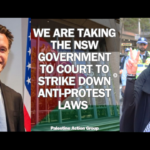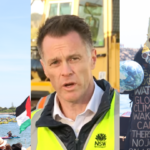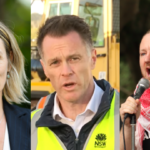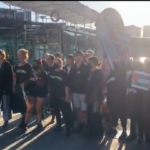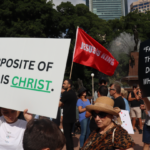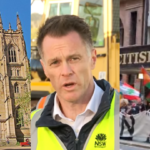NSW Supreme Court Hears Challenge Against Unjustified Anti-Protest Laws
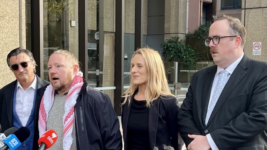
Appearing before the NSW Supreme Court on Thursday, 19 June 2025, Sydney activist Josh Less and his formidable legal team seem to have located a chink in the new antiprotest laws that the Minns government recently passed during a flurry of misinformation regarding a so-called “antisemitic” crimewave, with the measure being challenged likely to be rendered unconstitutional.
Acting on behalf of the Palestine Action Group, Lees told Sydney Criminal Lawyers on Friday, 20 June 2025 that his group is “very confident” that Justice Anna Mitchelmore will rule in favour of the legal action challenging the provision of a new power that allows NSW police to move on protesters for simply demonstrating “near a place of worship”, due to the “broad” and “undefined” wording of the law.
Passed on 21 February, the Crimes Amendment (Places of Worship) Bill 2025 contained measures first spruiked by NSW premier Chris Minns in early December last year, and along with the vaguely worded move on power that provides police with a wide discretionary berth, it also created the new offence of blocking access to a place of worship or intimidating those accessing or leaving it.
In representing Lees, esteemed barrister Felicity Graham told the court the “critical question” being posed was whether the law would allow officers to “direct protesters to move on or desist from their protest action because they are near a place of worship”, even if there was no basis to consider they were obstructing, harassing or intimidating attendees. And she added, the likely answer is it would.
The premier told the press on Thursday that he hadn’t banned protest, and he added that people do have a right to practise their “religion in a place of worship free of harassment, vilification or intimidation”, and the notoriously antiprotest-minded NSW Labor leader explained that the right to protest and to practise a religion, only compete in the vicinity of churches, mosques and synagogues.
Catch-all move-on power
“We’re here today because we’re challenging the latest set of antiprotest laws rushed through parliament by this Chris Minns Labor government,” Lees told the press out the front of the NSW Supreme Court on Thursday. “We maintain that the right to protest is a fundamental and crucial democratic right.”
“The laws that Chris Minns rushed through earlier this year, were passed under a big cloud of… lies and conspiracy,” he continued, “because the Minns government, we know, had been told that… the Dural caravan episode – this hoax that was going on at the time – the Minns government knew… that it was all part of a criminal con job, and yet, kept the parliament and the public in the dark.”
These laws are pertinent to the Palestine Action Group as it’s been running protests on Gadigal land in the Sydney CBD for the past 20 months relating to Israeli’s ongoing genocide in Gaza. Lees explained to SCL last month that the challenge is aimed specifically at the move on law now contained in section 200(5) of the Law Enforcement (Powers and Responsibilities) Act 2002 (NSW).
The well-known activist outlined that because the move on power involves merely being “near” a place of worship, and as there is no definition of near in the legislation, then it’s up to police on the beat to decide whether people who may be protesting any cause are too close to a place of worship, and in a city like Sydney, with churches everywhere, the law “covers great swathes of all of our city”.
“In particular, we’re challenging the ability for the police to move on any protests that could take place near places of worship,” the Palestine Action Group spokesperson confirmed before the court. “We say this is a big threat to the right to protest in this state because almost everywhere protests happen it’s near a place of worship.”
Stretching the limits of policing
Barrister Graham clarified in court that a 4 December protest that took place outside Sydney’s Great Synagogue, which was the “catalyst” for the Places of Worship Bill was not demonstrating against “a religious event”, but rather activists were protesting “a political event being held at the synagogue, a Technion event… at which an Israel Defence Forces member was speaking”.
The synagogue event was held on behalf of Technion, the Israel Institute of Technology, and it featured a returned IDF member presumably involved in the Gaza genocide. Graham pointed to comments made by Labor MLC Stephen Lawrence during debate, as he’d stated that the fact it was a political event made clear that the intention of the bill was not what the government was claiming.
“The move on powers are not intended to only operate when a place of worship is being obstructed,” Lawrence told parliament, “rather, the powers are enlivened when the protest is at or near a place of worship and when a police officer believes, among other things, that a person is being obstructed.” The Labor MLC added that the powers too breach international human rights law.
Graham explained that the “broad decisional area” that the term “near a place of worship” permitted, would prove difficult to interpret on the ground, she added that the broad move on power applied “beyond its legitimate bounds, when analysed for constitutional validity”, and it would likely be used to move on those not posing any access issues in relation to a place of worship.
A threat to democracy
The new antiprotest laws build upon the April 2022-established NSW antiprotest regime. These laws have worked to kill most unapproved demonstrations in NSW.
The new offence of intentionally blocking places of worship, contrary to section 214B of the Crimes Act 1900 (NSW), carries the signature draconian penalties that accompany all the offences involved in the NSW antiprotest regime, which provide a maximum of up to 2 years imprisonment and/or a fine of $22,000.
The Perrottet Coalition government rushed through these laws, and to the shock of many of its supporters, NSW Labor, then under the leadership of Minns, supported this broad crackdown on civil dissent. But after two years of his premiership, no one is now surprised that he supported the antiprotest regime, as he’s been successfully attempting to broaden it during his time in office.
Lees mentioned the “big cloud of lies” these laws were passed under, as he was referring to them being rammed through parliament with two other extreme rights-eroding hate crime bills, in the midst of Greater Sydney having been subject to a monthslong “antisemitic” crimewave. However, it’s since come to light that NSW police considered the crimes a hoax at the time the laws were passed.
The question that’s since arisen and is the subject of a NSW upper house inquiry at present is whether Minns was privy to the NSW police understanding that a caravan full of explosives found on a property in Dural and dozens of other “antisemitic” arson and graffiti attacks were part of a broad “criminal con job” designed to provide certain crims with a bargaining chip in dealing with police.
NSW police deputy commissioner Dave Hudson has told the inquiry he informed the premier and the police minister “very early on” that he considered the Dural caravan incident was likely a “setup”. But the NSW premier is refusing to appear before the inquiry, and he has too ordered his senior staff members not to testify before it either.
Greens MLC Sue Higginson recalled before the court on Thursday that the evening the laws were rammed through “was a dreadful night”, adding that she and other members that opposed the laws had done everything they could “to avoid this absurd affront on our democracy”. The NSW Greens justice spokesperson added that it was time that Minns attempted to “protect our democracy”.
“This law that’s been challenged today is part of a suite of laws that Minns has passed and should be ashamed of,” NSW Council for Civil Liberties president Timonthy Roberts added. “History will look very poorly upon this government. Indeed, we look very poorly upon this government. It’s one that should be disgraced by its attacks on our democracy… all for an appearance to seem strong.”


